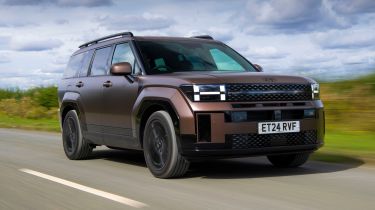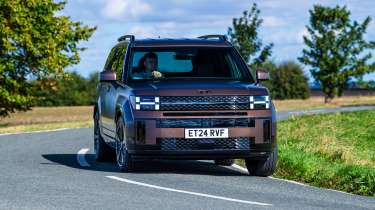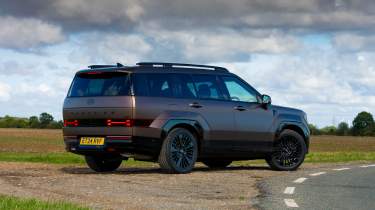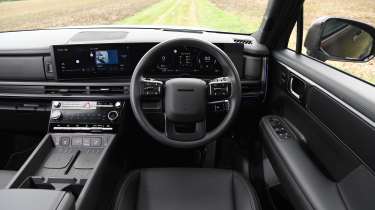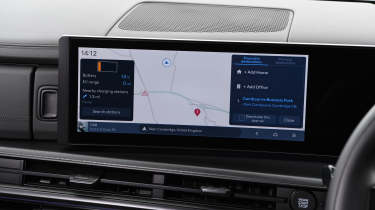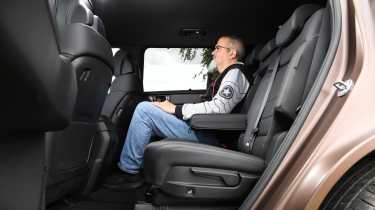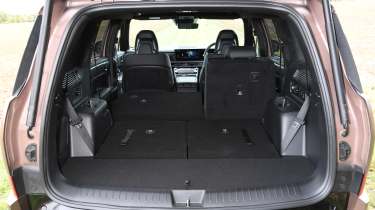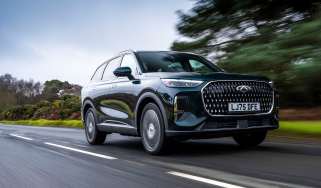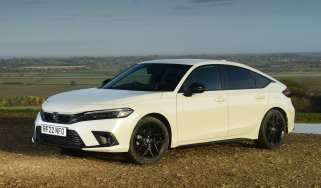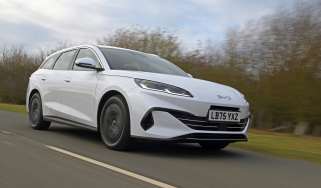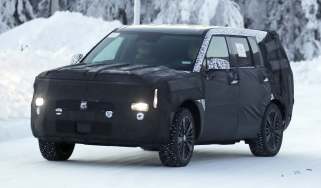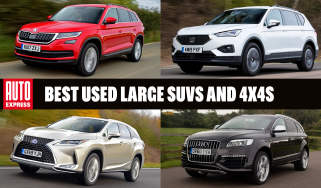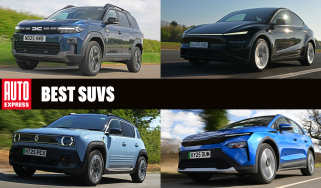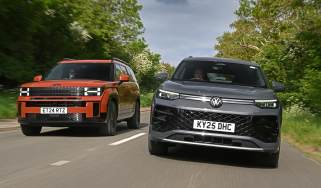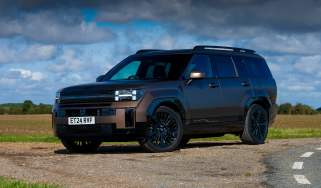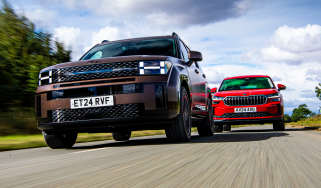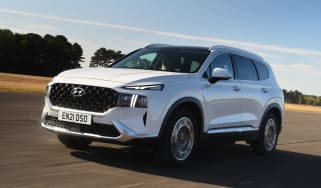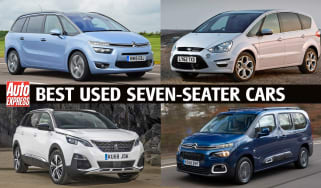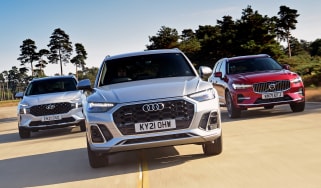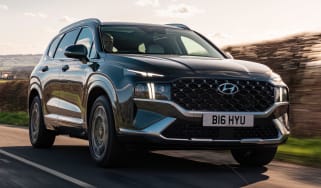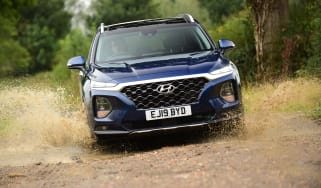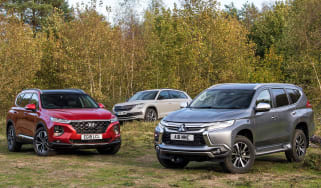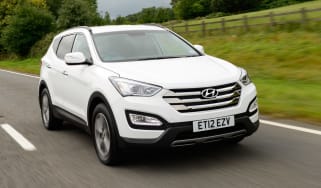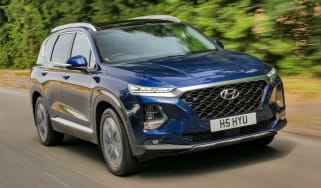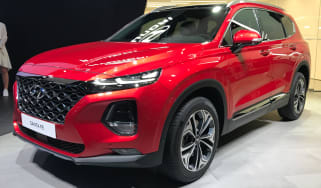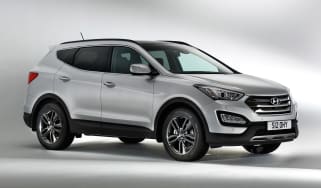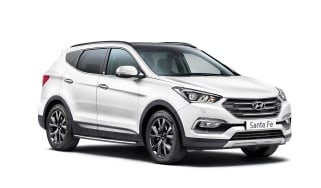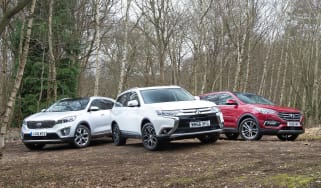Hyundai Santa Fe review
Bold-looking seven-seat Hyundai Santa Fe SUV delivers lots of space in a striking package

Is the Hyundai Santa Fe a good car?
The fifth-generation Hyundai Santa Fe is one of the most distinctive-looking seven-seat SUVs around. The design combines hints of Land Rover Defender with the hi-tech ‘pixel’ lighting motif used by Hyundai’s Ioniq electric cars. The interior is extremely spacious and there can be no complaints about the level of equipment on offer but Santa Fe isn’t particularly cheap compared to key rivals.
The car is offered with hybrid or plug-in hybrid (PHEV) powertrains. Neither is particularly efficient and the hybrid can sound coarse when worked hard. We also found that the big SUV feels a little more cumbersome on the road than seven-seat alternatives.
About the Hyundai Santa Fe
The four previous Hyundai Santa Fe generations were worthy cars, but a little forgettable. The current car’s boxy proportions really help it stand out from the SUV crowd. It won’t be to everyone’s taste, but it’s hard to deny that it’s distinctive.
The Hyundai Santa Fe sits at the top of the combustion-engined Hyundai SUV line-up, above the popular mid-size Hyundai Tucson, the Hyundai Kona and the Hyundai Bayon small SUV. There’s no diesel and no electric Santa Fe version to go with the hybrid and plug-in hybrid models, but the Hyundai Ioniq 9 EV fills the latter void in the model range.
Used - available now

2023 Hyundai
Santa FE
20,919 milesAutomaticPetrol1.6L
Cash £26,400
2023 Hyundai
Santa FE
55,121 milesAutomaticPetrol1.6L
Cash £25,400
2023 Hyundai
Santa FE
18,451 milesAutomaticPetrol1.6L
Cash £29,400
2023 Hyundai
Santa FE
33,331 milesAutomaticPetrol1.6L
Cash £26,600So far, we’ve twin tested the Hyundai Santa Fe against the Volkswagen Tayron and it narrowly lost. The big Hyundai also lost out against our 2025 Large SUV of the year, the Skoda Kodiaq in another in-depth twin test. In both examinations, the Hyundai’s interior space and design shone through but high prices and the driving experience were its downfall.
Hyundai Santa Fe prices, specs and latest deals
Prices for the Hyundai Santa Fe start from around £47,000, which gets you behind the wheel of the full-hybrid, front-wheel-drive version. Four-wheel drive is available as an option with the hybrid powertrain for around £2,000, or you can go for the plug-in hybrid with this as standard from just under £52,000.
Our network of trusted dealers is currently offering discounts on Santa Fe recommended retail prices via our Find a Car service. Alternatively, you can lease a Santa Fe or buy a used version, all on Auto Express.
Engines, performance & drive
Pros |
|
Cons |
|
The Hyundai Santa Fe looks particularly large, courtesy of its boxy styling, but it’s not as big as some SUVs and there are plenty of assistance systems to help you position the car on the road, although the number of warning beeps might infuriate. Its relaxing on-road manners seem ideally suited to a car in this segment.
The Hyundai Santa Fe Hybrid has front-wheel drive as standard, but does have the option of four-wheel drive. The latter can tackle some light off-roading using dedicated mud, sand and snow drive modes, plus a handy hill-descent control system.
Despite being a hybrid or plug-in hybrid, the Santa Fe has a multi-stage regenerative braking system like you would find in a full EV. You adjust its strength using paddles on the steering wheel. We would like it if the full-hybrid version had a stronger setting, because we found on our tests that the highest level can slow the car to a creep, but requires a lot of time and distance to do so.
0-62mph acceleration and top speed
The engine range starts with a hybrid that combines a 1.6-litre turbocharged petrol engine with an electric motor, energy for which is stored in a 1.49kWh battery and charged both through regenerative braking and by the four-cylinder engine. The end result is 212bhp and 267Nm.
There’s plenty of weight for that system to move around, though – more than two tonnes, depending on spec and kit – so performance is merely okay. A 0-62mph time of 9.6 seconds for the front-wheel-drive version and 9.8 seconds for a four-wheel-drive car makes the Santa Fe a touch slower than a Volkswagen Tayron with 148bhp at its disposal.
While the hybrid system is smooth at low speeds and when cruising, ask for some power and the petrol engine sounds very coarse. You can switch the powertrain into sport mode to at least give the perception of a little more urgency, but we found this to be quite jumpy, so for the benefit of other passengers it’s probably best avoided.
The plug-in hybrid model can’t match the electric-only range of VW Group rivals such
as the Tayron and the Skoda Kodiaq, but unlike them, the Santa Fe PHEV keeps a seven-seat layout. Power stands at 250bhp, but that increase is largely offset by the battery’s weight, so the 9.3-second 0-62mph time is only marginally faster than the hybrid model which has the same amount of torque at 367Nm.
| Model | Power | 0-62mph | Top speed |
| Santa Fe Hybrid FWD | 212bhp | 9.6 seconds | 112mph |
| Santa Fe Hybrid AWD | 212bhp | 9.8 seconds | 112mph |
| Santa Fe Plug-in Hybrid | 250bhp | 9.3 seconds | 112mph |
Town driving, visibility and parking
A lofty driving position gives a good view of your surroundings, while all versions feature front and rear parking sensors and a reversing camera to help with manoeuvres. Those squared-off edges work in its favour when placing the car, because it’s easy to judge the Hyundai’s forward edges when driving.
Light steering is also a bonus, while cameras in the door mirrors provide a live view of the car’s flanks in the instrument binnacle when the indicators are used. The 11.6-metre turning circle help the Santa Fe squeeze into parking spots that its boxy 4.8-metre-long frame would otherwise have you thinking twice about.
The ride at lower speeds is comfortable, while the hybrid system fills in the power band as the engine gets up to speed. The car’s warning beeps are slightly frustrating, though. There’s a distracted-driving warning that seemed to activate every time we looked anywhere other than straight ahead. This proved a particular nuisance when looking both ways before pulling out of a junction.
The PHEV model is quiet and refined around town because it favours electric drive as long as there’s enough charge in the battery. Hyundai claims an official range of 33.6 miles from a fully charged pack, while the transition from electric to petrol drive is smooth, with no transmission shunt between power sources.
Country road driving and handling
On more open roads, the Hyundai begins to feel its size. The fairly hefty kerbweight combined with a reasonably soft suspension set-up translates into body roll through corners, while the light steering that makes town driving a relative doddle feels a little over-assisted at higher speeds, so there’s not much feedback to rely upon.
While we’re not hoping for driving thrills here, there are rivals that don’t feel quite so lethargic, and a little agility brings many benefits, from making it easier to place the car on the road to having more confidence in performing an emergency manoeuvre if you might need to avoid a dangerous situation.
Another irritation of the audible warnings is that the car beeps when the road sign camera system detects a change in the speed limit, and does so again if you should breach it even by 1mph. It’s simple enough to deactivate the system with a long press of the mute button on the multifunction steering wheel, but current regulations mean it defaults back to ‘on’ every time you start the car. This is common on many new cars, but the Santa Fe’s system is one of the more intrusive.
At higher speeds, the Hyundai delivers plenty of comfort. Air suspension isn’t offered, but the conventional springs and dampers are tuned to absorb bumps effectively and keep the cabin calm.
Accelerating sees the engine become more vocal, and the hybrid model uses combustion power most of the time. As long as there’s some charge in the PHEV’s battery (and the system tends to retain around 15 per cent capacity when in use), then the electric motor will do most of the work. When you do wake the engine, it’s not a very pleasant-sounding unit, with a harsh note that is sustained by the gearbox holding on to ratios in the style of a CVT transmission.
Motorway driving and long-distance comfort
Once the Santa Fe is up to speed it’s a quiet and refined place to be. There isn’t much wind or road noise, while the suspension is only unsettled by large bumps, which cause the whole car to shudder.
The hybrid model isn’t at its best on the motorway because it’s more reliant on the engine for power – Toyota and Lexus still have the measure of rivals when it comes to hybrid efficiency. It’s a similar story with the PHEV when the battery has run down. If you do have some charge left, then the plug-in model will occasionally drive on electricity even at 70mph. There’s a reasonable amount of wind noise from that square external shape, but overall it’s refined, too.
MPG, emissions & running costs
Pros |
|
Cons |
|
The Hyundai Santa Fe should offer decent running costs around town, but we’d like to see a diesel option to boost efficiency on longer drives. Hybrid powertrains do their best work at low and medium speeds, where the electronics manage energy flow between the road and power sources, but a car such as the Santa Fe is a prime candidate for longer trips and towing, and here hybrid drive isn’t as efficient.
During our time with a Santa Fe PHEV, we saw the car’s trip computer returning fuel economy in the mid-30s on motorway runs once the battery was exhausted, but slower urban driving saw mpg figures in the mid-40s range. Since the plug-in hybrid (PHEV) starts using the petrol engine more frequently once the battery is down to around 15 per cent capacity, the system does at least proactively try to boost efficiency.
| Model | MPG | CO2 | Insurance group |
| Santa Fe Hybrid FWD | 41.5mpg | 155g/km | 33 |
| Santa Fe Hybrid AWD | 38.7mpg | 165g/km | 34 |
| Santa Fe Plug-in Hybrid | 166mpg | 38g/km | 36 |
Electric range, battery life and charge time
The plug-in hybrid powertrain offers buyers up to 33.6 miles of electric-only running, thanks to a 13.8kWh battery. As with any PHEV, it only makes financial sense if you can charge it up at a place of work or on a low-cost home electricity tariff. Unless you’re in that specific category, the less expensive and barely slower standard hybrid remains a better bet.
Since the Santa Fe PHEV only has a 3.6kW onboard charger, fully recharging it will take around four hours from a 7kW standard home wallbox charger. It’s also worth noting that the latest Peugeot 5008 PHEV has a zero-emissions range of up to 48 miles, while the Skoda Kodiaq iV boasts a massive 75-mile EV range.
Tax
List prices for the whole Santa Fe range are above the £40,000 mark for premium road tax, so while hybrid drive knocks £10 off the annual charge, it’s still a pricey car for Vehicle Excise Duty (VED).
Those high prices, combined with high emissions for the hybrid model, don’t help the Benefit-in-Kind (BiK) company car tax costs. With a figure of 155g/km, even the entry-level version sits in the higher tax brackets. The PHEV model does offer some savings, but its short all-electric range isn’t as competitive as rivals such as the Skoda Kodiaq, which dips into an even lower BiK band.
Insurance
Insurance costs for the Hyundai Santa Fe should be reasonable, but there are more affordable rivals out there. The entry-level front-wheel drive hybrid starts in group 33, rising to group 34 for the all-wheel drive version, while the quickest plug-in hybrid is in group 36. In comparison, the Skoda Kodiaq starts in group 18, while the plug-in hybrid version is in group 24.
Depreciation
The Santa Fe offers distinct appeal with its looks and the fact that it’s a new model, and its residual values of between 52-55 per cent reflect that because they’re slightly higher than the Skoda Kodaiq, which is predicted to maintain between 41-49 per cent of its original value over the same period.
The Ultimate trim of both the hybrid and plug-in hybrid have slightly stronger figures than the top-of-the-range six-seat Calligraphy model.
To get an accurate valuation for a specific model, check out our free car valuation tool...
Interior, design & technology
Pros |
|
Cons |
|
Compared with the Santa Fe’s exterior wow-factor, the cabin is more restrained. In terms of ergonomics and quality, there isn’t much to complain about, though, even if it’s not quite class leading in either area.
Even entry-level models come with dual 12.3-inch displays, a powered tailgate, wireless Apple CarPlay and Android Auto, a wireless smartphone charging pad, keyless entry, electrically adjustable heated front seats and a suite of driver assistance tech.
Upgrading to Ultimate adds a Bose premium sound system, a glass sunroof, head-up display, heated rear seats, ventilated front seats, plus dual charging pads. It’s also available with the optional Pecan Brown and Supersonic Grey interior themes.
Range-topping Calligraphy features Nappa leather upholstery, ‘Premium Relaxation’ front seats, plus gloss black exterior trim and wheels, while a UV-C sterilisation tray that can sanitise small items such as phones and keys with ultra-violet rays is added to the upper glovebox – the Santa Fe is the first production car to feature such a system.
Interior and dashboard design
Much like the outside, the Santa Fe’s cabin follows a boxy theme. There are hints of Range Rover in the steering wheel design, and elsewhere there’s a mix of chunky handles and catches for the various cubbyholes, and quite small, delicate switchgear on the dash.
There are big, physical dials to control the interior temperature, but most of the other climate controls are touch-sensitive, albeit on their own dedicated LCD screen. The gears are selected on a column-mounted shifter, which is quite intuitive to use and makes additional space on the dashboard for more storage.
Materials and build quality
All of the Hyundai’s main touchpoints give the car a premium feel, with high-quality materials and metal-effect switches boosting the ambience inside. The fit and finish of the cabin is good, too, although the large black plastic centre console might be a little utilitarian for some people.
There are some other touches that seem slightly cheap: for example, the front door handles are illuminated at night, but the rear ones aren’t. The general quality isn’t quite to the high level of the Peugeot 5008.
Premium and Calligraphy trims have a black interior scheme, but Ultimate is also available in light grey or tan options, which make the inside feel less gloomy and more special.
Sat-nav, stereo and infotainment
Hyundai has kitted the Santa Fe out with a pair of 12.3-inch screens that stretch across the top of the dashboard, with the main touchscreen curved towards the driver for ease of use.
Given that there is no budget version of the Santa Fe, all cars feature the same 12.3-inch touchscreen system. The infotainment system runs software that will be familiar to anybody who has driven a current Hyundai or Kia, with a menu system that can get a little involved, although the small Home button in the bottom right gets you back to square one if you need it. Navigation is standard and comes with five years of updates, plus wireless Apple CarPlay and Android Auto are included.
At least the climate controls are on a separate panel, although the touch-sensitive buttons aren’t the most intuitive to use.
Boot space, comfort & practicality
Pros |
|
Cons |
|
There’s a huge amount of space inside the latest Santa Fe, and every version is fitted with seven seats as standard. However, the top-of-the-range Calligraphy trim is available with a six-seat configuration that includes two individual captain’s chairs for the middle row.
Alternatively, if you’ve got young children and need a family car that can handle multiple child car seats, the Santa Fe features four sets of ISOFIX mounting points – two on the middle bench, and another two on the rearmost seats. Folding down the second row seats is done with the push of a button, and the third-row seats have straps that make folding them down even quicker and easier.
Dimensions and size
Measuring 4,830mm from nose to tail, the Hyundai Santa Fe Mk5 is 45mm longer than the old model. It’s longer, wider and taller than its key rivals, particularly the Skoda Kodiaq and Peugeot 5008, but a width of 1,800mm means it’s not as unwieldy as some wider premium SUVs, such as the Volvo XC90 or Land Rover Defender.
Dimensions comparison | |||
| Model | Hyundai Santa Fe | Peugeot 5008 | Skoda Kodiaq |
| Length | 4,830mm | 4,791mm | 4,758mm |
| Width | 1,900mm | 1,895mm | 2,133mm |
| Height | 1,780mm | 1,694mm | 1,656mm |
| Wheelbase | 2,815mm | 2,901mm | 2,791mm |
| Boot space | 628-1,959 litres (5 or 2 seat modes) | 348-2,232 litres | 340-2,035 litres |
Seats & passenger space
While the centre console is broad, there’s still plenty of room in the front seats, and a wide range of seat and wheel adjustment will suit all body shapes behind the wheel.
A tall roof means headroom isn’t an issue in the Santa Fe, while shoulder space in the middle row is fine for adults when travelling three-up. There’s a flat floor, and the front seat backs are hard plastic, so will take a kicking from careless feet. There are bag hooks on them, too, as well as USB sockets on the sides of the front seats. There are air vents on the B-pillars to help with ventilation, and they should be handy for those in the back on a hot summer day.
The middle row slides back and forth, and this helps with access to the rearmost row. Recessed handles in the C-pillars are designed to help when climbing up to the roof bars or into the back. Straps on the rearmost seat backs mean they can be lifted easily, while the back row has air vents and USB ports.
Unlike in some rivals, those third-row seats are good enough for more than just temporary use, too. Headroom is still plentiful, and kneeroom isn’t bad once those in front have sacrificed a little of their own space. Plus there’s no excuse for being thirsty in a Santa Fe; there are no fewer than 12 cup-holders in total, six of which are in the middle row.
If you’ve got young children and need a family car that can handle multiple child car seats, the Santa Fe features four sets of ISOFIX mounting points – two on the middle bench, and another two on the rearmost seats. Folding down the second row seats is done with the push of a button, and the third-row seats have straps that make folding them down even quicker and easier.
Boot space
The large tailgate is electrically operated, and it opens high to allow you to stand beneath it, plus there’s a low loading lip. Hyundai doesn’t quote boot space in seven-seat mode, but there’s room to play with – although not as much as you’ll find in a Skoda Kodiaq.
The hybrid model has a 628-litre boot in five-seat mode, and this increases to 1,949 litres with all the rear seats folded. The plug-in hybrid (PHEV) is slightly smaller, with figures of 621 and 1,942 litres. One minor issue is that there’s nowhere to put the load cover when it’s not in use. All models feature self-levelling suspension.
Towing
One area where the Santa Fe falls behind its rivals is towing. There’s a maximum capacity of 1,110kg irrespective of whether you choose the PHEV or the hybrid, or even if you opt for four-wheel drive for the latter. That’s a shame, because large SUVs like the Santa Fe are often bought to tow, and the PHEV version of the Skoda Kodiaq can haul 1,800kg (as can the standard petrol versions), while the diesel can tow up to 2,400kg in its most powerful guise.
“The Santa Fe’s six-seat layout gives those in the middle room even more space to stretch out, plus each chair gets an individual fold-out armrest to add to the sumptuous feel. It’s not a cheap option, though, and i’m not sure it’s really worth it.” - Alex Ingram, chief reviewer.
Reliability & safety
Pros |
|
Cons |
|
The Santa Fe only received a four-star out of five Euro NCAP score for the entry-level Premium version without the optional Smart Sense+ Pack, and the maximum five-star rating for mid-range Ultimate and above with it.
That's a little disappointing when its chief rival, the Skoda Kodiaq, has a five-star rating throughout the range. There are still plenty of other safety assistance highlights provided as standard, including a driver monitor, forward-collision avoidance, lane following and adaptive cruise control, although the assorted beeps and bongs that come with these features might become a source of irritation for some drivers.
Among the Santa Fe’s safety suite is ‘Highway Drive Assist’, which combines adaptive cruise control with stop-and-go functionality and lane following assist. Other tech on board includes forward-collision avoidance assist and driver-attention alert – although the latter can be activated just by looking either way when exiting a junction. Pricier models also feature ‘Blind Spot View Monitor’, which displays a feed from the exterior cameras on the driver’s display when you indicate.
The latest Hyundai Santa Fe was too new to make it onto our most recent list of top 50 cars to own in the 2025 Driver Power customer satisfaction survey. However, Hyundai finished 17th (out of 32) in the 2024 best car manufacturer rankings and then 20th in 2025. Owners who responded to our survey praised their cars’ infotainment, running costs and value for money.
| Euro NCAP safety ratings | |
| Euro NCAP safety rating | 4-stars (Euro NCAP, 2024) - 5-stars with the Smart Sense+ Pack |
| Adult occupant protection | 84% |
| Child occupant protection | 88% |
| Vulnerable road user protection | 70% |
| Safety assist | 69% (79% with the Smart Sense+ Pack) |
Buying and owning
Best buy: Hyundai Santa Fe Hybrid Premium
The entry-level Santa Fe Premium models have a single option: the SmartSense+ Pack. With its extra safety tech this lifts the car’s NCAP rating from four to five stars. At £1,500, it’s pricey, but it adds worthwhile features, such as blind-spot monitoring.
The plug-in hybrid motor is the more impressive of the Santa Fe’s options but it’s £4,000 more expensive than the hybrid. If you can charge it regularly and do lots of shorter trips, that could be worthwhile but we’d be inclined to stick with the hybrid model.
Hyundai Santa Fe alternatives
The Santa Fe is the biggest car in Hyundai’s UK line-up, and there are several large, seven-seat SUVs that it competes against. One chief rival is the recently facelifted Kia Sorento, which uses the same platform and features the same engines, but is also offered with a diesel engine, which means it has a lower starting price. Other rivals include the Skoda Kodiaq – our reigning Large SUV of the Year that comes in petrol, PHEV and diesel guises – and the latest Peugeot 5008, which is available in pure-electric form as the Peugeot E-5008.
Frequently Asked Questions
The beeps and bongs of the Santa Fe’s safety systems can be infuriatingly annoying. Most can be deactivated via the touchscreen, but you can quickly disable the speed limit and overspeed warnings by giving the mute button on the multifunction steering wheel a long press. A message will appear on the touchscreen confirming you’re successful, although bear in mind that you’ll need to do this every time you start the car.
